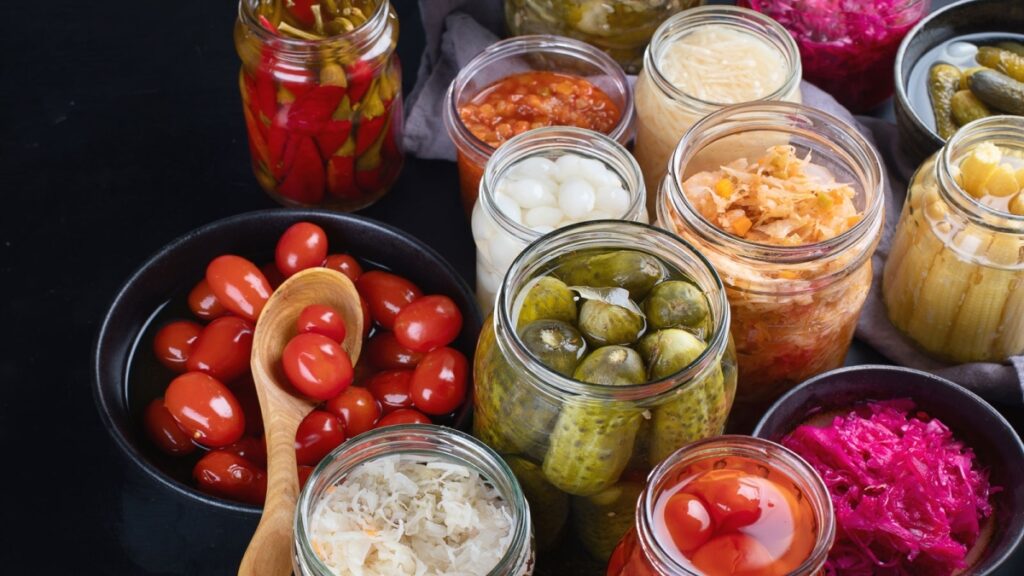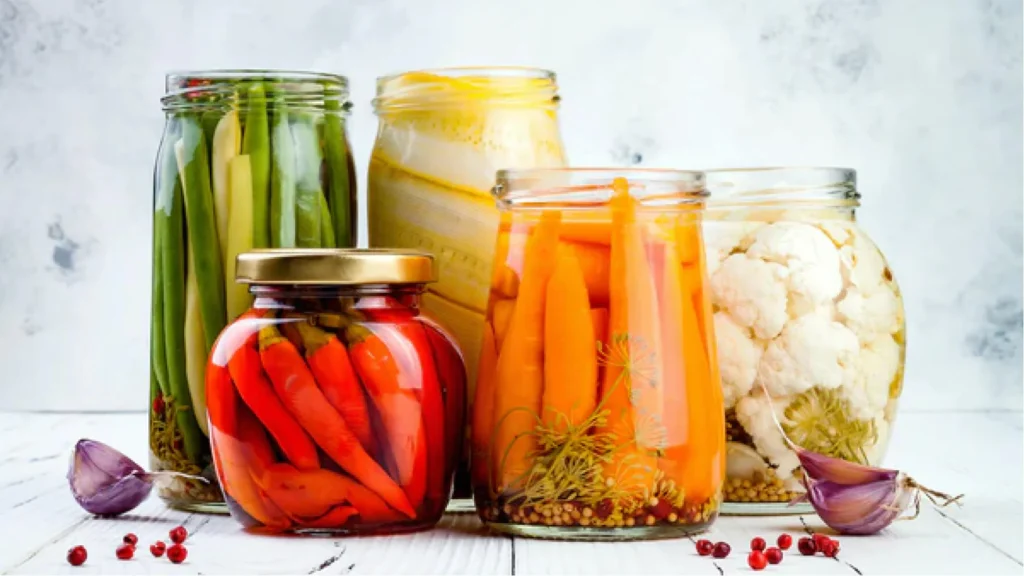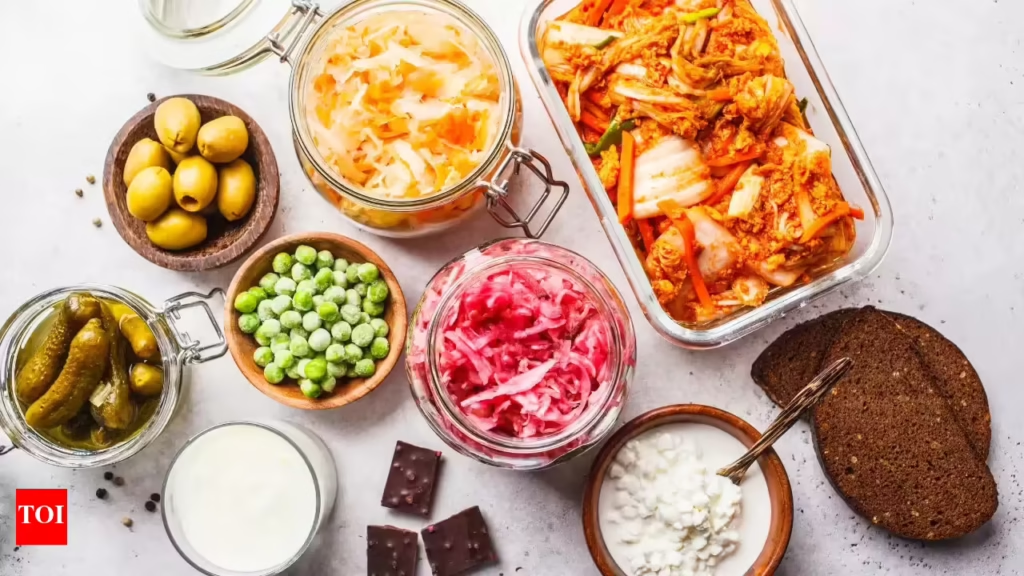In recent years, the importance of gut health has come into the spotlight—and for good reason. A healthy gut supports digestion, boosts immunity, and even affects mental well-being. One of the most effective ways to maintain a balanced gut microbiome is through fermented foods. Packed with probiotics, these foods feed your body with beneficial bacteria that help improve digestion, absorption, and overall health.
In this article, we’ll explore:
What are fermented foods?
How they benefit your gut
The top fermented foods you should include in your diet
Tips on how to eat them
FAQs on fermentation and gut health
Whether you’re looking to relieve digestive issues, boost your immunity, or just feel better overall, this comprehensive guide will help you make smart, gut-friendly choices.
What Are Fermented Foods?

Fermented foods are foods and beverages that have undergone controlled microbial growth and fermentation, meaning natural bacteria and yeasts break down sugars and starches into simpler substances. This process creates probiotics—live microorganisms that provide numerous health benefits, especially for your digestive system.
Common examples include yogurt, kimchi, sauerkraut, and kefir.
The Science Behind Fermentation
During fermentation:
Lactic acid bacteria break down sugars into lactic acid.
This acid acts as a natural preservative and gives fermented foods their tangy flavor.
It also enhances the bioavailability of nutrients like B vitamins, iron, and magnesium.
Why Gut Health Matters
The human gut is home to trillions of microorganisms collectively known as the gut microbiome. This complex ecosystem influences:
Digestion of food
Nutrient absorption
Immune system function
Mood and mental health
An imbalance in gut bacteria (known as dysbiosis) can lead to:
Bloating, gas, constipation, or diarrhea
Food intolerances
Skin issues like acne or eczema
Weakened immunity
Anxiety or depression
Fermented foods restore balance by replenishing good bacteria and promoting diversity in the microbiome.
Top Fermented Foods for Gut Health

Let’s take a closer look at the most powerful fermented foods you can add to your diet for a healthier gut.
1. Yogurt
Best for: Everyday probiotic support
Made from milk fermented with lactic acid bacteria, yogurt is one of the most accessible probiotic foods.
Benefits:
Contains live cultures like Lactobacillus and Bifidobacterium
Helps ease symptoms of lactose intolerance
Supports regular bowel movements
Tips:
Choose plain, unsweetened yogurt with “live and active cultures”
Avoid yogurts with high sugar content or artificial flavors
2. Kefir
Best for: Higher probiotic variety
Kefir is a fermented milk drink similar to yogurt but thinner in consistency and richer in probiotics.
Benefits:
Contains 30+ strains of good bacteria and yeast
May improve lactose digestion and reduce inflammation
Supports immune function and bone health
Tips:
Start with ½ cup a day and increase gradually
Opt for unsweetened varieties or make your own at home
3. Sauerkraut
Best for: Fiber and probiotic combo
Sauerkraut is fermented cabbage that offers both probiotics and dietary fiber—a perfect combo for gut health.
Benefits:
Rich in Lactobacillus plantarum, known for supporting gut barrier function
Boosts immunity with vitamin C and antioxidants
Tips:
Choose unpasteurized sauerkraut (pasteurization kills probiotics)
Look for it in the refrigerated section, not on the shelf
4. Kimchi
Best for: Gut-boosting flavor with a kick
A spicy Korean side dish made from fermented vegetables (usually napa cabbage and radishes) and a blend of spices.
Benefits:
Contains lactic acid bacteria and prebiotic fiber
May reduce cholesterol and regulate blood sugar
Supports weight management and metabolic health
Tips:
Incorporate it into rice bowls, soups, or omelets
Homemade versions let you control spice and salt content
5. Miso
Best for: Fermented flavor in soups and sauces
Miso is a Japanese paste made by fermenting soybeans with koji (a type of fungus) and salt.
Benefits:
Contains Aspergillus oryzae and other beneficial microbes
Rich in essential amino acids, vitamins, and antioxidants
Tips:
Use in broths, marinades, and salad dressings
Avoid boiling miso—high heat can destroy probiotics
6. Tempeh
Best for: Plant-based protein with probiotics
A fermented soybean cake originally from Indonesia. It’s firm, nutty, and packed with protein.
Benefits:
High in probiotics and fiber
Supports digestion and nutrient absorption
Excellent meat alternative for vegetarians and vegans
Tips:
Steam or sauté lightly to preserve probiotic benefits
Add to salads, sandwiches, or stir-fries
7. Kombucha
Best for: Refreshing probiotic drink
Kombucha is a fizzy fermented tea made using a SCOBY (symbiotic culture of bacteria and yeast).
Benefits:
Improves gut flora and supports liver detox
Contains B vitamins and organic acids
May improve mental clarity and mood
Tips:
Watch sugar content—many commercial brands add too much
Start with small servings to avoid bloating
8. Pickles (Fermented, Not Vinegar-Based)
Best for: Crunchy probiotic snack
Only naturally fermented pickles offer gut health benefits—not those preserved in vinegar.
Benefits:
Support digestion with lactic acid bacteria
Provide fiber and electrolytes
Tips:
Look for pickles with “live cultures” and no vinegar
Try fermenting your own with just cucumbers, water, salt, and time
How to Add Fermented Foods to Your Daily Diet

Adding fermented foods doesn’t require a drastic change—just consistency and balance.
Tips for Everyday Use:
Start slow: Begin with small amounts (2–3 tablespoons/day) and increase gradually to avoid gas or bloating.
Pair with meals: Add kimchi to rice bowls, sauerkraut to sandwiches, or kefir to smoothies.
Diversity is key: Rotate between different fermented foods to introduce a wider range of probiotics.
Avoid pasteurization: High heat kills beneficial microbes. Always check for “raw,” “unpasteurized,” or “live cultures” labels.
Stay hydrated: Water helps flush toxins released by dying harmful bacteria.
Frequently Asked Questions (FAQs)
Q1: Are all fermented foods probiotic?
No. Some fermented foods like sourdough or beer are cooked or pasteurized, which kills the live cultures. Only those with active, live microbes (like raw kimchi or unpasteurized sauerkraut) are probiotic.
Q2: Can fermented foods replace probiotic supplements?
Fermented foods can often be more beneficial than supplements because they come with natural enzymes, fiber, and bioavailable nutrients. However, in cases of severe imbalance or after antibiotics, supplements may be helpful in combination.
Q3: Are there any side effects of eating fermented foods?
Some people may experience bloating or gas initially as their gut flora adjusts. If symptoms persist, consult a nutritionist or reduce intake.
Q4: Are fermented foods safe for everyone?
Most people tolerate fermented foods well, but those with histamine intolerance, mold sensitivity, or certain GI conditions (like SIBO) may need to be cautious.
Final Thoughts
Fermented foods are a natural, delicious way to boost your gut health. By introducing a variety of these nutrient-rich, probiotic-packed items into your meals, you can:
Strengthen digestion
Improve immunity
Balance your mood
Enhance overall vitality
Whether it’s a spoonful of yogurt in the morning, a cup of kombucha in the afternoon, or some kimchi with dinner—your gut will thank you.
Related posts:
 How Stress Affects Digestion – Gut Health & Mental Wellness Connection
How Stress Affects Digestion – Gut Health & Mental Wellness Connection
 The Role of Gut Microbiome in Overall Health: The Hidden Ecosystem Within You
The Role of Gut Microbiome in Overall Health: The Hidden Ecosystem Within You
 Aging and Digestive Changes in Seniors: What You Need to Know
Aging and Digestive Changes in Seniors: What You Need to Know
 Nutritional Benefits of Different Foods: A Guide to Healthy Eating
Nutritional Benefits of Different Foods: A Guide to Healthy Eating
 Maha Shivratri Foods and Prasadam: A Complete Guide to Sacred Offerings and Vrat-Friendly Recipes
Maha Shivratri Foods and Prasadam: A Complete Guide to Sacred Offerings and Vrat-Friendly Recipes
 Best Foods for Rainy Season – Monsoon Diet Tips for a Healthy Life
Best Foods for Rainy Season – Monsoon Diet Tips for a Healthy Life
